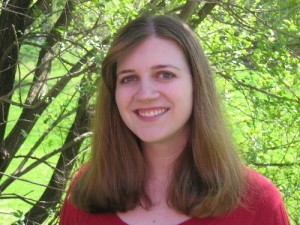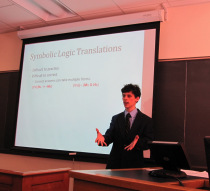This report is a good start at a national conversation on the importance of non-STEM fields. Check it out here. Leave your thoughts below.
Author: Paul Youngman
Interested in MOOCs? I’m not. Check out the new article in the New Yorker.
Over five years ago, Professor Paul Gregory from the Philosophy Department came to the Computer Science Department with a problem.  He needed a computer application that not only would help students practice symbolic logic for his Philosophy 170: Introduction toLogic course, but could also assist him in his grading by automatically correcting symbolic logic quizzes. In agreeing to collaborate with Gregory, little did Professor Sara Sprenkle realize that she was going to become to go-to computer science person for humanities professors across W&L. For, since then, Sprenkle’s partnership has been sought on a number of other digital humanities projects for faculty throughout the university.
He needed a computer application that not only would help students practice symbolic logic for his Philosophy 170: Introduction toLogic course, but could also assist him in his grading by automatically correcting symbolic logic quizzes. In agreeing to collaborate with Gregory, little did Professor Sara Sprenkle realize that she was going to become to go-to computer science person for humanities professors across W&L. For, since then, Sprenkle’s partnership has been sought on a number of other digital humanities projects for faculty throughout the university.
At present, Sprenkle is working on two digital humanities projects in addition to Gregory’s symbolic logic tutorial. The first is with former Mellon Postdoctoral fellow and current Assistant Professor at Marquette University Professor Sarah Bond to develop a site that would allows users to examine the evidence and literature for ancient voluntary associations. The second and most recent project with Professor Rebecca Benefiel of the Classics Department seeks to explore the relationships of graffiti in ancient Herculaneum. Benefiel and Bond projects are similar in that both wanted to be able to search large collections of ancient inscriptions in order to look at them in different ways, allowing them uncover new things about the ancient world.
While at first glance, it may appear as though these collaborations benefit only Gregory’s logic classes or Benefiel and Bond’s research, this is hardly the case. Indeed, these digital humanities collaborations have proven to be tremendously important for Sprenkle’s own research on web applications. “My research looks at what can we learn from what users actually do,” Sprenkle explained. “I do software testing research specifically on web applications. We need real applications and have people really using them. I can use these applications in my research to learn how to do better testing for these applications.”
This is precisely what these projects with Gregory, Benefiel, and Bond have provided. For example, Gregory’s symbolic logic tutorial is one of the five web applications Sprenkle and her research collaborators at the University of Delaware look at. “The logic application is great,” Sprenkle described, “because we have actual users.” In fact, over the last two semesters, it had over 800 user sessions. Sprenkle and her research collaborators have published three papers evaluating testing techniques using the symbolic logic tutorial, a clear indication of the value of this project to Sprenkle’s research.
But it is not just Sprenkle’s research that benefits from digital humanities collaborations here at W&L. They are also amazing opportunities for students here as well. In fact, this was something that Sprenkle recognized immediately. “I thought it would be a great application for our students to work on,” Sprenkle said.

Richard Marmorstein ’14, a double major in Computer Science and Economics, agrees. Since the summer of 2012, Marmorstein has been working with both Gregory and Sprenkle on the symbolic logical tutorial. “Usually you’re working on code that your professors have coded for you and modifying it or rewriting code from scratch,” Marmorstein said. “But this was code that other people had written that weren’t professors so it was a little messy going in to it, which is like real life. The people that you work with aren’t always perfect in writing code so it was a real, practical experience.”
This real, practical experience is already paying off for students. Because they are working with an actual client, i.e. Gregory, Benefiel, or Bond, students working under Sprenkle’s supervision on her three digital humanities projects, either as part of her web applications course or as independent studies, are more attractive to potential employers. Her students have reported how “recruiters eyes light up when they start talking about these projects because personal interactions are really important to employers.”
“Students learn a lot from these projects,” Sprenkle added. “And when they talk to their client later, they not only think they were cool projects, but also fun and worthwhile.”
DH Initiative Meeting Today
5PM, Southern Inn. Please come. We are looking for ideas for next steps.
Let’s keep calling it DH
Here’s another point of view regarding the Pannapacker article in the Chronicle advocating DIgital Liberal Arts. Worth a read.
Day of DH 2013
Take part in this annual event that documents the lives of scholars who consider themselves digital humanists. Check it out here – Day of DH 2013.
Death of the Dissertation?
Excellent for thought from the Chronicle. Check it out here:
The Dissertation Can No Longer Be Defended
Austin College DH Symposium
Professor Paul Youngman from the Department of German and Russian will represent W&L at the Austin College DH symposium in February. This is a Mellon sponsored gathering with focus on DH in small liberal arts colleges.